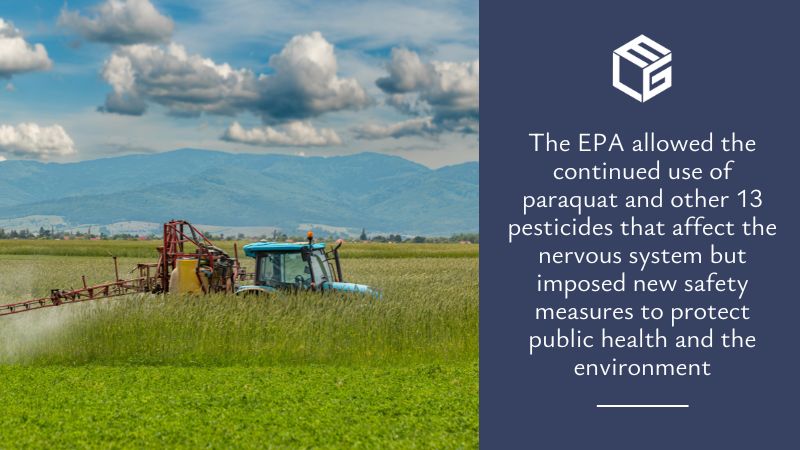-
About »
- Insulin MDL
-
Cases »
- Diseases
- Testimonials
- Government
- Contact
- Get Help Now
-

As a highly toxic herbicide for weed and grass control, paraquat is frequently used in operations that focus on commercial crops. However, because it is a hazardous substance, paraquat is a restricted use herbicide, which means that only certified licensed applicators can purchase and use it for crops such as potatoes, cotton, soybeans, peanuts, sugarcane, and vegetables. It is worthy of note that paraquat poisoning and paraquat exposure are different, as the former occurs immediately, whereas the latter is a cumulative process. If you were exposed to paraquat as an applicator or someone working closely with a paraquat applicator and developed Parkinson's disease, you are eligible to file a claim to recover financial compensation.
Claim ApplicationSince 1962, paraquat has been widely used throughout the United States for weed and grass control, as it is a very strong herbicide. However, paraquat is also highly toxic, which often makes poisoning fatal. Even a single sip of paraquat can kill you.
Nevertheless, there is a difference between paraquat poisoning and paraquat exposure. While the former results in immediate symptoms, such as pain and swelling of the mouth and throat, the latter occurs gradually and can eventually lead to Parkinson's disease over the years.
Because once paraquat enters the body, it will travel throughout your system to vital organs, including the brain, the risk of developing Parkinson's disease as a result of exposure is very high, particularly if you use the herbicide yourself.
There is a strong connection between exposure to paraquat and Parkinson's disease. It is important to know that people with a history of paraquat exposure will slowly develop Parkinson's disease, as this brain disorder is progressive and the symptoms tend to worsen over time. The following are the early signs of the disease you should look for in a family member who was exposed to paraquat, so that you can take them to a medical specialist to have their health assessed:
When a person is exposed to paraquat, the herbicide will travel through the stomach or the lungs and eventually reach a part of the brain medically known as the substantia nigra pars compacta. It is responsible for releasing dopamine, a crucial neurotransmitter that has a very important role in how we experience pleasure. When paraquat reaches this area of the brain, it will deplete the neurons that produce dopamine, a process that is associated with Parkinson's disease. The damage caused by paraquat to the neurons that release dopamine will ultimately result in the impairment of certain essential brain functions.
Prolonged exposure to paraquat is known to cause Parkinson’s disease in agricultural workers by increasing their risk of developing this condition by 250%.
In the United States, a major paraquat manufacturer is Syngenta. However, there may be other, more obscure companies that manufacture this herbicide.
Similarly, the paraquat you use may be imported and thereby manufactured by a company outside of the country.
Paraquat is sold under the following brand names throughout the United States:
If your family member worked with paraquat, you need to keep a close eye on their health, as they have a significant risk of developing Parkinson’s disease. If they already have this diagnosis and have a history of occupational paraquat use, we strongly encourage you to contact our law firm, as we specialize in toxic exposure and we can help you as a family member recover the financial compensation they are entitled to from the liable manufacturers.
The herbicide is currently sold under dozens of brand names across the country. Exposure occurs by inhaling the vapors the herbicide releases after it is applied to crops, as ingestion is, in most cases, fatal.
The following are the occupations that may entail paraquat exposure:
Due to the lack of a warning on the product's label regarding the danger of developing Parkinson's disease as a consequence of exposure, paraquat manufacturers can be held liable for negligence and failure to warn if a person comes to struggle with this neurodegenerative disease. While it cannot reverse the physical and emotional damage, the financial compensation that might be available to paraquat exposure victims can help with their medical expenses.
With over 30 years of experience in pursuing compensation on behalf of victims of toxic exposure, our attorneys are ready to provide you with quality legal assistance if you were exposed to paraquat after 1962 and subsequently developed Parkinson's disease. It is important to know that only the diagnosis of Parkinson’s disease makes you eligible to seek compensation from the liable manufacturers. We accept cases nationwide. Although the legal process is quite complex and tedious, it will require minimal involvement on your part, and a family member can help you navigate it, as we are aware that most of our clients are in great physical and emotional distress. We will file your claim with all the responsible paraquat manufacturers so that you will receive the maximum amount of compensation available for your disease. If you have a family member who was exposed to paraquat and shows symptoms of Parkinson’s disease, we advise you to reach out to our legal team, as we have the necessary knowledge and resources to help you determine whether they are eligible to file a claim. For additional information, please feel free to contact us, and we will promptly answer your questions.
It is the responsibility of the manufacturer to warn consumers of the known dangers and risks associated with their products.
When companies fail to inform users of the risks, as is the case with paraquat manufacturers, they potentially threaten the lives of any person who uses their product.
Crop dusters, farmworkers, herbicide applicators, chemical mixers, tank fillers, and residents of nearby communities, who have worked with paraquat and have been diagnosed with Parkinson's disease, are now beginning to file product liability claims alleging the following:
Additionally, the work conditions - hot/humid climate, lack of adequate personal protective equipment, leaking/clogged equipment, continuous use, lack of washing facilities, lack of training/awareness, and lack of medical facilities - made its use particularly hazardous. Paraquat was often mistakenly ingested because containers for drinking water and storage or mixing of paraquat were confused, and the herbicides have been found available in stores in repacked containers without proper labeling.
Because weeds are becoming more and more resistant to glyphosate, sold under the brand name of Roundup, which is another toxic herbicide, it is estimated that the employment of paraquat will increase within the following years. This will inevitably lead to a larger number of Parkinson’s disease cases, as paraquat exposure has a strong causal relationship to the development of this condition. A medical study published in the American Journal of Epidemiology found that any exposure to paraquat, whether it is in the workplace or in close proximity to your home, increases the risk of developing Parkinson’s disease by 75%.
If one of your family members worked with paraquat and came to struggle with Parkinson’s disease, we strongly encourage you to contact our legal team, as we specialize in toxic exposure and will help them recover the compensation they deserve from the liable manufacturers by filing a claim on their behalf. At the moment, approximately 60,000 people receive a diagnosis of Parkinson's disease every year throughout the United States, but the number of cases is expected to increase dramatically within the following years, as the use of paraquat is becoming more and more prevalent. So far, we have filed over 1,000 paraquat claims.
Because there is no doubt that paraquat is a very toxic herbicide, the Environmental Protection Agency has recently come up with a series of new safety measures.
The purpose of these protective measures is to decrease the extent of exposure to paraquat and represent a very important step in ensuring the well-being of agricultural workers who use the herbicide, as well as that of the people who live in close proximity to farming communities where the herbicide is used.
The following are the safety measures proposed by the agency:
Furthermore, the Environmental Protection Agency is proposing to allow truck drivers who are not certified applicators of paraquat to transport the herbicide only when certain criteria are met. Hopefully, these requirements will come into effect soon, and we will subsequently see a decrease in the number of people who develop Parkinson’s disease as a result of paraquat exposure.
See more questions Frequently Asked Questions



